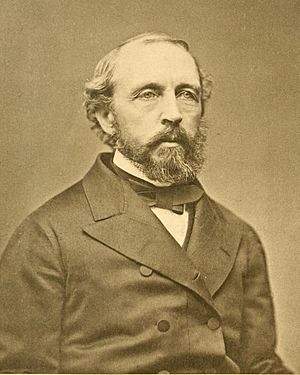William Rounseville Alger facts for kids
Quick facts for kids
William Rounseville Alger
|
|
|---|---|

Alger in 1876
|
|
| Born | December 28, 1822 |
| Died | February 7, 1905 (aged 82) |
| Occupation | Minister and author |
| Children | 7, incl. Philip Rounseville Alger Abby Langdon Alger |
| Relatives | Horatio Alger (cousin) |
William Rounseville Alger (born December 28, 1822 – died February 7, 1905) was an American Unitarian minister. Unitarians are a type of Christian faith that believes in one God. He was also a writer, poet, and editor. Alger was a strong supporter of abolitionism, which means he worked to end slavery. He even served as a Chaplain for the lawmakers in the Massachusetts House of Representatives.
Early Life and School
William Rounseville Alger was born in Freetown, Massachusetts. This was on December 28, 1822. His parents were Nahum and Catherine Sampson Alger.
When he was young, William went to an academy in Pembroke, New Hampshire. To help pay for his studies, he worked part-time at a cotton mill. He later went to the Harvard Divinity School. He graduated from there in 1847. After graduating, he became a Unitarian minister. He started preaching in Roxbury, Massachusetts, and stayed there until 1855.
His Work and Activism
After 1855, Alger moved to the Bulfinch Street Church in Boston. He became very well known in Boston. He often spoke to large crowds at places like Tremont Temple. He also traveled and preached in many other states. These included New York, Colorado, Illinois, and Louisiana.
William Alger was a dedicated abolitionist. This meant he believed slavery was wrong and fought to end it. He was also a Free Mason, which is a social and charitable organization. He wrote for and helped edit different magazines, like the Christian Examiner.
In 1857, he gave a speech for Boston's Fourth of July celebration. In this speech, he talked about the problem of slavery. His words were very bold for the time. Because of this, the city at first refused to publish his speech. But seven years later, the city changed its mind. They published his speech and thanked him for it.
Alger was also the first regular pastor for an Episcopalian church in Biddeford, Maine. This church was built in 1869. He also worked at the All Souls Unitarian Church in Roxbury. Later, he served at The Church of the Messiah in New York. This was an important Unitarian church.
He also served as the Chaplain for the Massachusetts House of Representatives. This meant he led prayers for the state's lawmakers. The speaker of the Massachusetts House of Representatives, Harvey Jewell, liked Alger's prayers so much. He asked for them to be written down and published.
Later Life and Family
William Alger passed away on February 7, 1905.
Some of his personal notebooks are kept safe today. You can find them at the Harvard Divinity School library and the New York Public Library. He wrote many books and hymns. Many of his works were printed again and again. His hymns are still found in songbooks today.
William Alger married Anne Langdon in 1847. They had seven children together. Two of their notable children were Philip Rounseville Alger and Abby Langdon Alger. Philip became an officer in the United States Navy. Abby was a translator, meaning she changed texts from one language to another.
William Alger also had a famous cousin named Horatio Alger. Horatio was a well-known author. He wrote many popular books about young people who became successful. Even though Horatio was more famous, some people believed William was the "more talented" writer.
Images for kids
 | Audre Lorde |
 | John Berry Meachum |
 | Ferdinand Lee Barnett |


